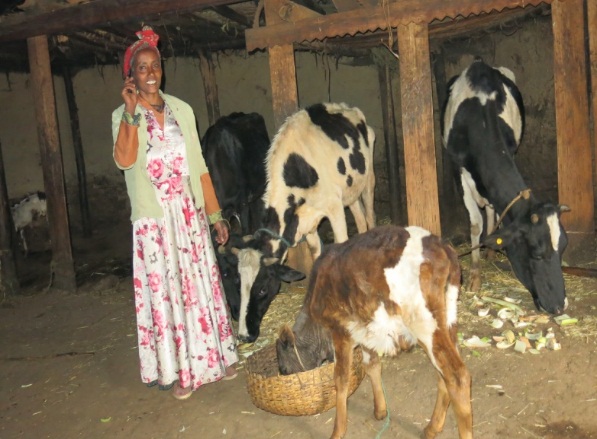Mobile Literacy Training Enables Women Entrepreneurs To Make Informed Decisions
Almaz Delgeba is a female entrepreneur who lives in Lera, Berebera district, in Selta zone in the Southern Nations, Nationalities, and Peoples’ Region (SNNPR) of Ethiopia. Delgeba is a leader of a dairy association in her locality, with 13 members scattered in a rural setting. One of her duties is to facilitate meetings between association members where participants can share market information as well as announce upcoming meetings. For Delgeba, a middle-aged woman with six dependents, moving around the village to convey messages was very challenging. A year ago, however, she was approached by USAID’s Agricultural Growth Program – Livestock Market Development (AGP-LMD) project and asked to take a training on mobile use for women entrepreneurs, which led to the purchase of a mobile phone.
At the training, Delgeba learned how to use a calculator, how to fill in monetary amounts, and how to save contacts. “At the beginning, the only thing I knew was how to receive and make phone calls. The practical training on how to use more of the tools on my mobile is now helping me to exchange timely market information and to also manage some parts of the finances in a better way,” Delgeba said.
“There have also been many cases when I had to use my mobile phone for emergency calls to the animal health workers in the locality when the milking cows got sick. Timely treatment enabled them to recover,” Delgeba said, who is also in charge of looking after the three milking cows quartered in her compound. Without a mobile phone and the know-how to use it, Delgeba’s only option would be to walk or to send one of her boys if he wasn’t in school. “If I took transport to pass the message, it would cost me 30 ETB; making the call may cost me 10 ETB,” she said.
Delgeba still finds it challenging to recharge her mobile phone. Since her village doesn’t have power, she needs to travel to the nearby town to do so.
“I spend 2 ETB daily to recharge. The transport cost makes it more costly,” she said, “though the benefits for her do outweigh the costs.” Her association, which began with three heifers a year ago, is now supplying milk to a nearby café, and two of the heifers have given birth. Thanks to her phone she was able to check the prices of milk in other towns before fixing her association’s price at $0.63-$0.68 (14 to 15 ETB) per liter. “Within the next three to six months, my plan is to buy a better mobile with more tools, as what I have now sometimes cuts off in the middle of a talk. I will make sure that the new one includes a radio, as it will teach me about different things while I perform my duties,” Delgeba said.
Delgeba is grateful for USAID’s support, and she has shared her know-how with five of the association’s 13 members who own mobile phones to help them benefit as well.



